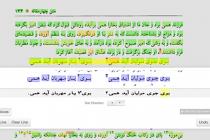Mellon Foundation Awards $2.8M for Research, Digitization in Humanities
The Andrew W. Mellon Foundation has awarded two grants totaling $2.8 million to the University of Maryland, College Park (UMD) to encourage research in black digital humanities and to develop technology expanding digital access to books from the pre-modern Persian and Arabic world.
A $2 million, three-year grant will support the second phase of the African American History, Culture and Digital Humanities (AADHUM) initiative. Housed in the College of Arts and Humanities (ARHU), AADHUUM seeks to expand and institutionalize the field of black digital humanities at UMD and beyond. The first phase of the initiative was also funded by The Mellon Foundation.
"African American history and culture are central to American history and culture," said Bonnie Thornton Dill, dean of the college and professor of women’s studies. "Making this knowledge widely available and giving people the opportunity to have hands-on experiences using digital technology to tell important stories is critical to enhancing our democracy."
She will continue to lead the project with Daryle Williams, associate professor of history and ARHU associate dean for faculty affairs, and Trevor Muñoz, interim director of the Maryland Institute for Technology in the Humanities (MITH) and assistant dean for digital humanities research in the University Libraries.
They will establish a long-term home for black digital humanities at UMD by hiring additional faculty, formalizing a competitive graduate research training and professionalization experience, offering mentor-training programs, expanding research partnerships with historically black colleges and universities (HBCUs) and developing best practices for tenure and promotion in black digital humanities.
Muñoz said AADHum has transformed the practice of digital humanities at MITH.
“If MITH offers a workshop on digital mapping, we need to make space for discussing the vulnerability that mapping certain populations, like activists or undocumented immigrants, creates,” he said.
The second Mellon Foundation grant, of $800,000 over two years, will support the development of user-friendly, open-source software capable of creating digital texts from Persian and Arabic books.
Matthew Thomas Miller, assistant professor in the Roshan Institute for Persian Studies in the college’s School of Languages, Literatures, and Cultures, leads an interdisciplinary team of researchers from Northeastern University, Aga Khan University (AKU) in London and the University of Vienna along with Raffaele Viglianti, research programmer at MITH.
"We realized that there was work being done separately in different areas to create tools for digitizing Persian and Arabic documents," said Miller, "but there wasn't a lot of communication across fields and these new advances were not making their way into the hands of users."
To date, the development of digitization software has primarily focused on Latin-script languages, and in many cases requires specialized knowledge to run. Existing Persian and Arabic digitization tools fall short on accuracy and are often prohibitively expensive for academic and public users.
"These thousands of unread texts are a potential treasure trove," said Miller. "Until we really get into it and begin digitizing and then examining them, we won't know what we might find or what new narratives and histories might unfold."
As part of the research team’s commitment to innovative software development and collaborative, interdisciplinary research, it will foster a community of users by hosting regular training sessions, establishing online user groups and teaching an undergraduate digital humanities class hosted jointly at Maryland and AKU through UMD's Global Classrooms Initiative.
The grant will also fund two postdoctoral fellows and two graduate fellows in computer science and Middle Eastern studies.
"Our goal is to grow capacity throughout these fields," Miller said, "which means both training scholars of Persian and Arabic in digital methods and computer scientists in the particularities of Persian and Arabic documents."





